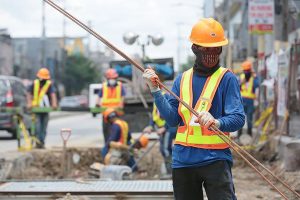Wholesale price growth of construction materials in the National Capital Region (NCR) rose in April, the Philippine Statistics Authority (PSA) reported on Friday.
The construction materials wholesale price index (CMWPI) in Metro Manila slightly picked up by 0.3% year on year in April, inching up from the 0.2% growth in March. However, this was lower than the 0.7% growth recorded in April 2024.
In the four months to April, Metro Manila’s CMWPI averaged 0.2%, slower than 1% growth during the same period.
The pace recorded in April was the fastest in nine months or since the 0.5% growth in July 2024.
Contributing to last month’s increase were faster growth in tileworks (3.6% from 1% in March), sand and gravel (0.4% from 0.3%), electrical works (0.4% from 0.3%), and painting works (1.1% from 1%).
The year-on-year growth in other commodities remained unchanged when compared with the previous month: plumbing fixtures & accessories/waterworks (0.9%) and doors, jambs, and steel casement (0.4%).
In a separate report by the PSA, the construction materials wholesale price index (CMWPI) in April eased to 1%, lower than 1.2% growth of March. It also cooled from 1.2% in April 2024.
Year to date, CMRPI averaged 1.1%, easing a bit from 1% growth in January-April 2024.
April print was the lowest in more than a year or since the 0.6% in March 2024
The CMRPI is based on 2012 constant prices, while the CMWPI is based on 2018 constant prices.
The PSA attributed the slower annual CMWPI growth to prices in carpentry which slowed down by 0.4% in April from 0.7% in March and tinsmithry materials with 1.5% from 1.6%.
Commodity groups where rates steadied were painting materials and related compounds (2.4%), plumbing materials (0.7%) and miscellaneous construction materials (0.3%).
Jonathan L. Ravelas, senior adviser at Reyes Tacandong & Co., said that the modest construction growth could be influenced by several factors such as election ban and tariff risks.
“The ban on public works during the election period can lead to delays in construction projects and procurement of materials. This restriction, aimed at preventing the misuse of public funds for electioneering, often results in a temporary slowdown in construction activities. This can affect the demand for construction materials, contributing to the modest growth observed,” Mr. Ravelas said in a Viber message.
Mr. Ravelas added that tariffs on imported construction materials can increase costs and disrupt supply chains.
“These tariffs create uncertainty in the market, as companies may face higher expenses and delays in material delivery, impacting overall project timelines and budgets,” he said. — Lourdes O. Pilar

